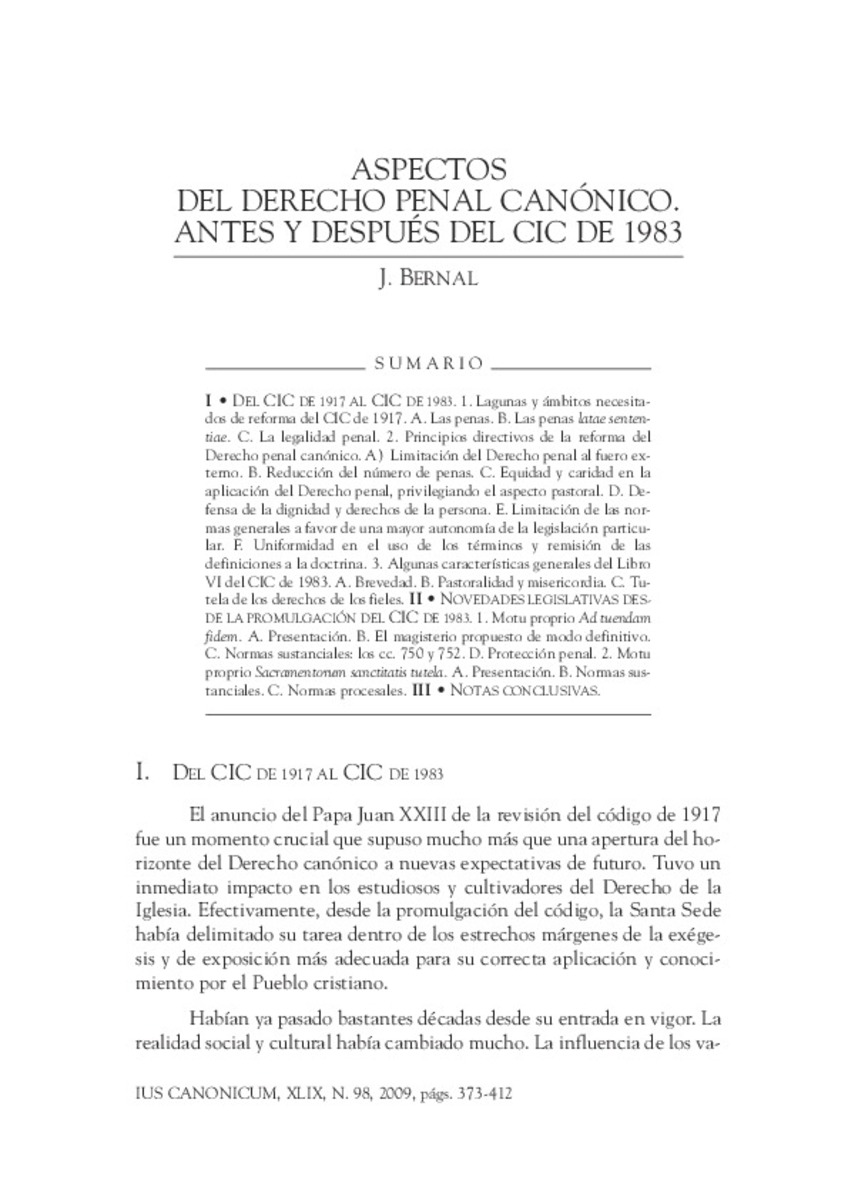Full metadata record
| DC Field | Value | Language |
|---|---|---|
| dc.creator | Bernal-Pascual, J. (José) | - |
| dc.date.accessioned | 2014-08-11T07:30:37Z | - |
| dc.date.available | 2014-08-11T07:30:37Z | - |
| dc.date.issued | 2009 | - |
| dc.identifier.citation | IUS CANONICUM, 2009, XLIX, N. 98, págs. 373-412 | es_ES |
| dc.identifier.issn | 0021-325X | - |
| dc.identifier.uri | https://hdl.handle.net/10171/36279 | - |
| dc.description.abstract | La reforma del Derecho penal canónico, cuyo fruto es el Libro VI del CIC de 1983, ha reducido el ámbito sometido a coacción, ha potenciado el recurso a la caridad y la equidad en la aplicación del Derecho, ha intentado compaginar la defensa del bien común con la tutela de los derechos subjetivos y ha facilitado los instrumentos para que la responsabilidad en el ejercicio de la potestad coactiva quede más repartida entre los gobiernos central y local. Las principales novedades legislativas después del CIC de 1983 se refieren a la recepción completa de las diversas formas de magisterio (motu proprio Ad tuendam Fidem) y han aclarado importantes cuestiones sobre la delimitación de los delicta graviora y la competencia sobre ellos (motu proprio Sacramentorum sanctitatis tutela). Las crisis padecidas recientemente por la Iglesia deberían mover a una toma de conciencia del papel que corresponde al Derecho penal canónico en la protección y defensa del bien común. | es_ES |
| dc.description.abstract | The reform of the penal canon law, whose fruit is the Book VI of the CIC of 1983, has reduced the area subject to coercion, has strengthened the recourse to charity and equity in the application of the law, has attempted to match up the defense of the common good with the protection of subjective rights and has facilitated the instruments so that the responsibility in the exercise of the coercive power may be more distributed between central and local go- vernments. The principal legislative novelties after CIC of 1983 refer to the complete reception of the various forms of magisterium (motu proprio Ad tuendam Fidem) and have clarified important issues on the delimitation of the delicta graviora and the competence on them (motu proprio Sacramentorum sanctitatis tutela). The crises suffered recently by the Church should lead to an awareness of the role corresponding to penal canon law in the protection and defense of the common good. | es_ES |
| dc.language.iso | spa | es_ES |
| dc.publisher | Instituto Martín de Azpilcueta | es_ES |
| dc.rights | info:eu-repo/semantics/openAccess | es_ES |
| dc.subject | Reforma del Derecho penal canónico | es_ES |
| dc.subject | Magisterio definitivo | es_ES |
| dc.subject | Delicta graviora | es_ES |
| dc.subject | Reform of the Penal Canon Law | es_ES |
| dc.subject | Definitive Magisterium | es_ES |
| dc.title | Aspectos del Derecho penal canónico. Antes y después del CIC de 1983 | es_ES |
| dc.type | info:eu-repo/semantics/article | es_ES |
| dc.identifier.doi | 10.15581/016.49.2680 | es_ES |
Files in This Item:
Statistics and impact
Items in Dadun are protected by copyright, with all rights reserved, unless otherwise indicated.






